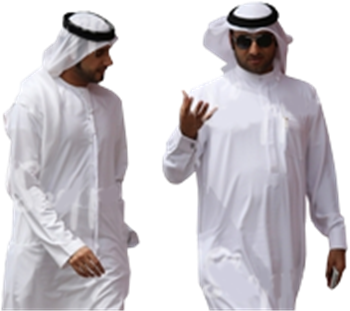(单词翻译:单击)

Many consider the term the “Arab world” to be a misnomer, for while it identifies a linguistic region with deep historical, cultural and religious affinities it lumps together, say, a Dubai and an Aleppo. Yet many of those same people find it hard to remember a time when this region’s prospects looked more uniformly bleak. Everyone can discern the commercial vibrancy of a city like Dubai, and differentiate it from the apocalyptic ruins of Aleppo, the war-stricken business hub of Syria. But there is a pall of violence and upheaval that seems to envelop the region as a whole.
许多人认为“阿拉伯世界”这个词是个误称,因为它识别了一个具有深厚历史、文化和宗教渊源的语言区,但同时也把迪拜和阿勒波(Aleppo)归为一类。然而,其中不少人也认为,很难想起这一地区的整体前景有比现在看上去更加黯淡的时期。每个人都看得到迪拜那种城市的商业活力,并能把它跟受到战争摧残的叙利亚商业枢纽阿勒波的末日废墟区分开来。但是,一团暴力和动荡的乌云似乎笼罩着整个地区。
Ethno-sectarian war is cracking Syria and Iraq into de facto partition, with Isis and its cross-border caliphate in both countries threatening the rest of the Levant — and beyond. The cycles of upheaval in Egypt, the most populous Arab state, have turned the country inwards, menaced by Isis in the Sinai to the east and from a crumbling Libya to its west. The absolute monarchies of the Gulf reacted to the wave of the “Arab Spring” turmoil with a mix of repression and largesse, hosing their subjects into quiescence with handouts worth tens of billions of dollars. The oil price collapse has made the long-term affordability of this moot.
民族-宗派间的战争使叙利亚和伊拉克出现裂痕,陷入事实上的分裂状态,这两个国家境内的“伊拉克和黎凡特伊斯兰国”(ISIS)及其跨境哈里发,对黎凡特(Levant)其他地区乃至更遥远的地方构成威胁。在埃及这个人口最多的阿拉伯国家,一拨又一拨的动乱使该国把目光转向内部,在东面的西奈半岛受到ISIS的威胁,在西面受到摇摇欲坠的利比亚的威胁。面对“阿拉伯之春”动荡,海湾的绝对君主制国家综合运用压制和慷慨解囊两种手法作为应对,拿出数百亿美元让国民闭口不言。油价下跌使得这么做的长期负担能力带有问号。
Progress is visible, as this report shows — from the growing confidence of women in business in Saudi Arabia to entrepreneur Karim Tazi speaking out against corruption in higher places in Morocco. Oil majors remain attracted to Iraq and its vast hydrocarbon reserves, while arms manufacturers, backed by casuistic western governments, continue the scramble for lucrative contracts from Saudi Arabia to the United Arab Emirates.
正如本报告所显示的那样,进步是可见的——从沙特商界女性的信心不断增强,到企业家Karim Tazi大声疾呼、反对摩洛哥高层的腐败现象。大型石油企业仍被吸引到伊拉克,同时在言行不一的西方政府支持下,军火生产商继续争取从沙特和阿联酋等阿拉伯国家获得利润丰厚的合同。
Yet the sense of lost opportunity and wasted potential weighs heavily. Talk of Iraq as an oil superpower to rival Saudi Arabia seems premature when this fracturing country cannot deliver electricity to its citizens, let alone security. Egypt signed big contracts this spring, mainly in energy and infrastructure, at an economic summit in Sharm el-Sheikh, a place now better known as the airport where a bomb was placed on a Russian plane. The political class in Lebanon, historically a free-wheeling, laissez-faire economic environment but deeply divided on sectarian lines, cannot agree on a president or terms for overdue general elections, much less how to share recently discovered offshore gas riches, which remain untouched.
不过,错失机遇和浪费潜能的感觉非常沉重。有关伊拉克将成为媲美沙特的超级石油大国的言论似乎过早了,因为这个陷入分裂的国家尚不能为国民提供电力(更别提安全保障了)。今年春天,埃及在沙姆沙伊赫召开的一次经济峰会上签了多份大单,尤其是能源和基建领域的合同。如今,沙姆沙伊赫更被人熟知的是,一枚炸弹在那里被放到一架俄罗斯飞机上。黎巴嫩在历史上拥有一个自由自在、放任不管的经济环境,但沿着宗派界线存在深层次隔阂。该国的政治阶层不能在总统人选或早该举行的大选的条件上达成一致,更别提如何分享近年发现的海上天然气储量了,这些资源至今没有开发。
The weaknesses of institutions, substandard education, and a rule of law at the whim of ruling elites, inhibit domestic as well as foreign investors. They cloud the future of youthful populations made aware by the digital revolution of opportunities they are being denied.
机构薄弱、教育水准不达标,加上统治精英视法治为儿戏,使国内外投资者却步。这些因素为大批年轻人的未来蒙上阴影。数字革命令年轻一代意识到他们被剥夺了什么样的机会。
The talent is there. Farouk al-Kasim, an Iraqi engineer from Basra, helped design the structure of Norway’s oil industry and its vast sovereign wealth fund, the envy of the world. Steve Jobs, the late chief executive of Apple, was the son of a Syrian immigrant.
阿拉伯世界不缺人才。来自巴士拉的伊拉克工程师法鲁克阿勒卡西姆(Farouk al-Kasim)帮助设计了挪威石油工业和该国庞大主权财富基金的结构。该基金令全世界艳羡。苹果(Apple)已故首席执行官史蒂夫吠布斯(Steve Jobs)是一名叙利亚移民的儿子。
Arabs do well abroad. Arab countries on the whole, afflicted by cronyism, corruption and state capture by authoritarian elites, need to do far better.
阿拉伯人在国外表现出色。深受裙带关系、腐败和威权精英掌控国家困扰的阿拉伯国家,总体上需要做得比目前好得多。
But there are attempts to fight back. A group of expat executives called Lebanese International Finance Executives (Life), for example, is trying to leverage the very strong position of the diaspora in international finance houses to inject knowledge and entrepreneurial opportunity back into their country. The group also suggests foreigners looking to invest need a mix of patience and empathy.
但是,有些人已经在试图迎接挑战。例如,一群被称为黎巴嫩国际金融高管(Life)的外派高管,正努力利用国际金融机构中该国移民的强大地位,将知识和创业机会带回自己的祖国。这个组织还建议寻求投资的外国人拿出耐心和同理心。
Asked what lessons she would offer investors wanting to do business in the region, Paola Barbarino, the Italian chief executive of Life, makes three essential points. First, “give time for relationships to develop” — it is best not do business after first meetings. Second, “respect the wealth of trading experience that the person you’re dealing with can draw on”. Third, “try and understand beforehand the context in which the person operates”.
当被问及她会对想到阿拉伯世界做生意的投资者提供什么经验时,意大利籍的Life首席执行官保拉巴尔巴里诺(Paola Barbarino)提出了三个要点。第一,“花时间培养关系”——最好不要见过一次面之后就做生意。第二,“尊重你打交道的人可以利用的丰富交易经验”。第三,“事先努力了解此人运作的大环境”。
Rapport and personal contact is at the heart of business dealings everywhere in the Arab world, which takes time, patience — and an appetite for risk.
在阿拉伯世界的任何角落,相处融洽和个人联系在生意中都扮演着核心角色——这需要时间、耐心和愿意承担风险。


